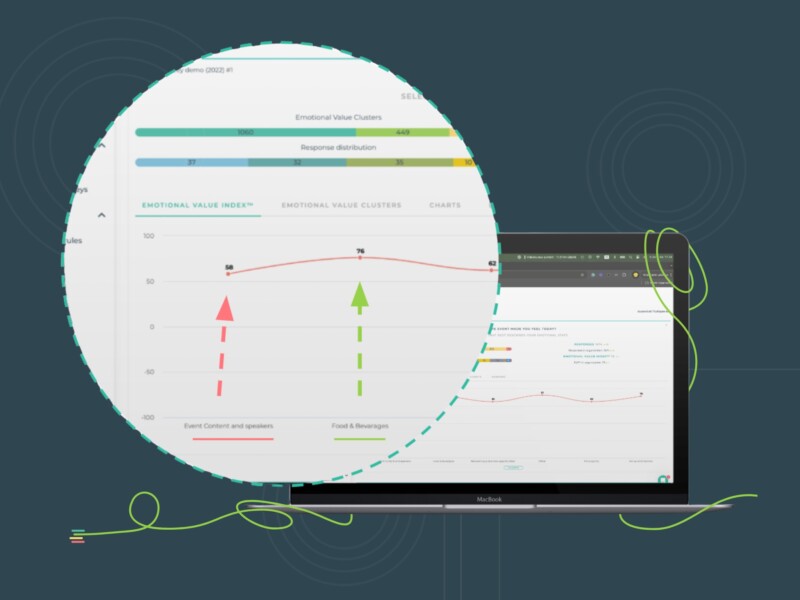Conventionally, B2B relations are viewed purely as rational interactions between business entities because partnerships are primarily formed considering performance-related data and cost-benefit analysis. For this reason, the role of emotions in the realm of B2B has often been undermined.
But this notion is being debunked as we speak, and for good reason.
We often overlook the fact that B2B interactions are carried out by people themselves and human beings are innately wired to be responsive to emotions. As such, emotions can play a pivotal role in shaping perceptions, eventually influencing the actions and decisions in the B2B sphere.
A study by Inspire shows that only 34% of decisions in B2B are rational, with 66% having emotional connections, while in B2C, the figures are 32% and 68%, respectively. So, emotions play as big a role in B2B as they do in B2C!
Let’s dive more into the role of emotions in B2B.
The Importance of Emotions for B2B Brands
Understanding the emotional landscape helps B2B businesses build a good rapport with their clients and fuel long-term relationships with their partners. It also allows businesses to tailor their strategies to suit the prospects and tailor the sales pitch to resonate with the buyer’s moods and concerns.
In addition, recognizing and managing emotions is vital for B2B businesses to overcome challenges and navigate complex negotiations. When brands are empathetic and understanding of the concerns of their counterparts, they are more adaptable to changing situations and are more resilient. Essentially, emotions help B2B brands to thrive better, nurture interdependent relations, and grow collectively.
What Type of Emotions Dominate the Realm of B2B?
Trust
Trust is fundamental to any B2B relationship, and it is perhaps the most impactful emotion with the power of forging partnerships as well as breaking them. Evoking trust comes with reliability, integrity, and transparency. This means you fulfill promises as discussed, offer prompt support when required, and are consistent with offering high-quality solutions. Trust is the cornerstone for long-lasting client relationships.
Satisfaction
Similar to B2C, brands in B2B should also strive for client satisfaction. With an exceptional client experience, after-sales support, and open communication, you can improve your vendors’ satisfaction – not just regarding your products/services but also about the overall engagement. Usually, emotions like Joy or Enthusiastic are great examples of emotions to aim for.
Excitement
Evoking excitement needs B2B brands to step up their game – moving away from traditional sales pitches and business interactions. Investing in novel technologies or solutions to offer a hassle-free and intuitive user experience is one way to go about it. But it can also be done with practical demonstrations on using the product, showcasing success stories, and prioritizing their needs! In the EVI emotion selection, Enthusiastic is designed to describe excitement.
Respect
B2B brands have a lot to gain by focusing on building respect. Respect is cultivated through authenticity and credibility. Demonstrating your expertise clearly, communicating respectfully yet honestly, and valuing client feedback can strengthen the respect businesses have towards each other. When your clients show respect, it is also a mark of the integrity of your brand. They will not hesitate to recommend your business to their counterparts.
In the EVI emotion circle, the emotion Trust also encompasses the level of respect. Typically, the traditional follow-up question ‘Why this emotion?’ helps to identify the specific reasons for selecting the emotion and reveals any underlying respect issues through the open-ended responses.
How to Build Strong Emotional Connections in B2B
As with B2C, nurturing a strong emotional connection in B2B requires a proactive approach. You need to invest time and effort into understanding your client, their needs and requirements, industry-specific pain points, and their expectations of your brand.
More importantly, B2B brands need to understand the emotions driving their clients’ decisions, gather feedback, and measure the emotional experience offered by the brand. In addition to helping you personalize the solutions to meet their needs, an in-depth understanding of customer sentiments and needs demonstrates that you are invested in their satisfaction and success.
Finally, appeal to your clients’ emotions at every stage in their buying journey. Remember that your audience isn’t purely rational decision-makers. They are like any other customer, with different emotions guiding their daily activities. From the sales pitch to after-sales support, B2B brands need to evoke positive emotions like trust, satisfaction/joy, and excitement/enthusiasm to forge enduring partnerships, boost loyalty, and also differentiate your brand in a competitive field.



